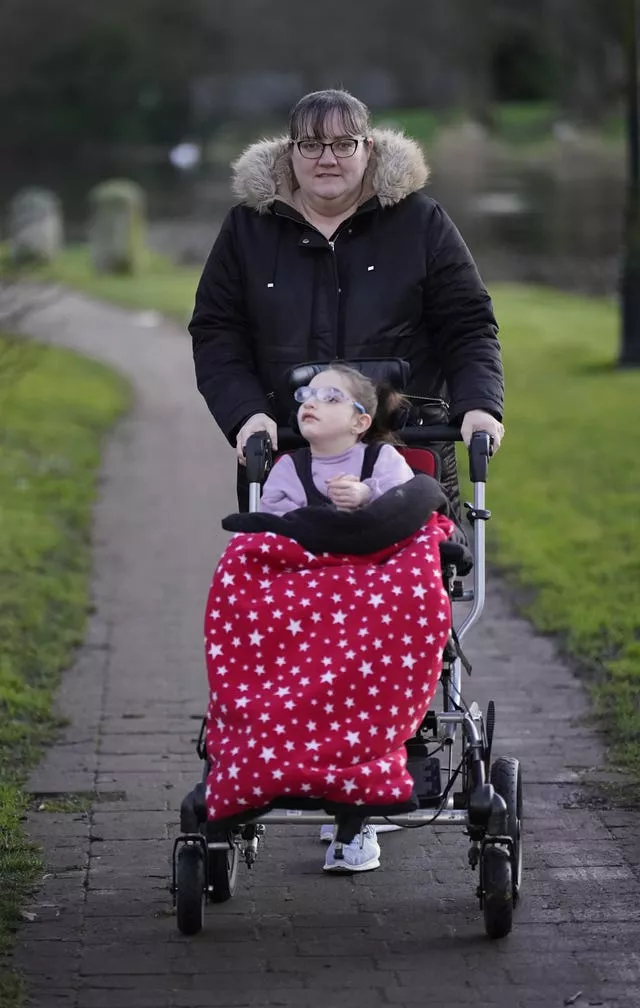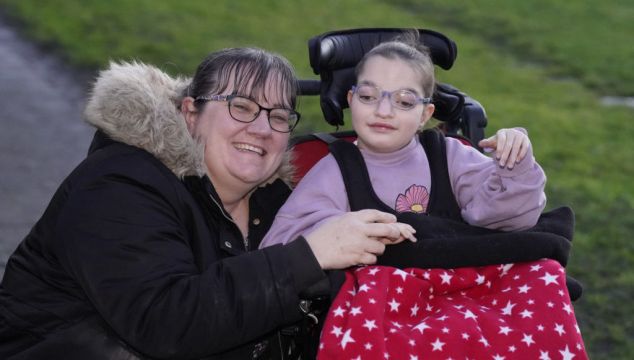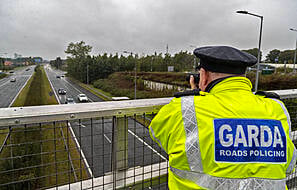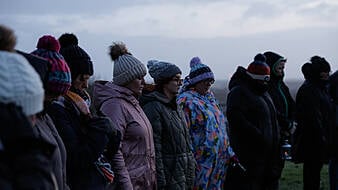A mother of four disabled children who provides round-the-clock care is calling for a No vote in the care referendum, saying the proposed amendment fails to give her family any rights.
Samantha Kenny, from Co Kildare, said the wording means her children and others will be “reduced to a burden of care”.
She said the wording, which recognises care between family members, does not recognise her children’s rights to independence and choices.
Samantha is mother to four children aged 18, 16, 12 and eight.
She cares full-time for her youngest, Ava, who has Wolf-Hirschhorn syndrome.

“We have everything in our house from learning disabilities, to neuro divergences, to physical disabilities,” Ms Kenny told the PA news agency.
“I’ve been a carer for the last 10 years and I am currently doing a college course because the cost of living means that I have to re-enter the workforce whether I like it or not.
“Ava is the one that has the most complexities and the highest care needs, and has the most contact with the different state agencies and bodies, and she’s the one that I’ve had to fight the hardest for.
“Wolf-Hirschhorn syndrome affects her in every way imaginable.
“She is a full-time wheelchair user. She has epilepsy, a heart condition, she has a hearing difficulty and she has cortical visual impairment. She has low muscle tone and she has a hole in her heart as well. And she’s a legend.
“She does not communicate with words. But she doesn’t need to because with three brothers, she has perfected the side-eye and knows exactly how to get what she wants, when she wants.
“We literally do everything for Ava. She cannot even get herself out of bed without support. She needs assistance with feeding, she needs assistance with every aspect of her life. She cannot do anything independently, but we’re working on it.
“She requires 24-hour care seven days a week.”
The family receive ten hours of outside help each week and one weekend every month.
“The level of care you receive is not based on need, it’s based on your area and what they can provide for you,” Samantha added.
The Kildare woman said she has “huge issues” with the proposed wording.
Two referenda will be held on March 8th proposing to change the Irish Constitution.
The family amendment proposes extending the meaning of family beyond one defined by marriage and to include those based on “durable” relationships.
The care amendment proposes deleting references to a woman’s roles and duties in the home, and replacing it with a new article that acknowledges family carers.
Samantha said while she does not want the current wording retained, she will be voting against the amendment.
“The new one is not going to protect me either. It’s reducing Ava to a burden of care,” she added.
“Her rights, her independence, her choice and everything doesn’t matter because her care is based on whether the family can provide or not.
“There is no mention of community, there’s no mention of the State providing that care. They’re just going to ‘strive’ to support the care that we’re providing.
“So, they’re not providing any care either. Ava is reduced to a burden of care. I keep hearing that they’re trying to remove sexist language. I’m a female carer that is being been told I don’t have a choice but to care for my loved one whether I want to or not, because now her care is at the behest of the family.

“As 60 per cent of carers are women, I don’t see how women are being removed from the Constitution, when we are just replacing it with carer.
“Just because 40 per cent are men, it doesn’t mean that the 60% don’t still exist.
“How can they say it’s not sexist, when there’s women with disabilities, even a little girl with disabilities, and she’s now been put into the Constitution as needs to a burden of care.”
Ms Kenny was also critical of opposition parties who are advocating for a Yes vote for the care referendum, but have raised concerns with the proposed wording.
Some parties, including Labour, Sinn Féin and Social Democrats, criticised the Government after it opted not to use the wording as recommended by the Citizens’ Assembly on Gender Equality.
The group advised to replace the wording with language that was not gender-specific and “obliges the State to take reasonable measures to support care within the home and wider community”.

“If you have a problem with the wording you shouldn’t be voting it in. It’s that simple,” Ms Kenny added.
“They have an opportunity here now where they can say no, and then they demand better wording. We had it in the past.
“Everybody has the potential to be a carer or be cared for. Everybody is one accident away, or just ageing, into being cared for or being a carer of somebody else.”







